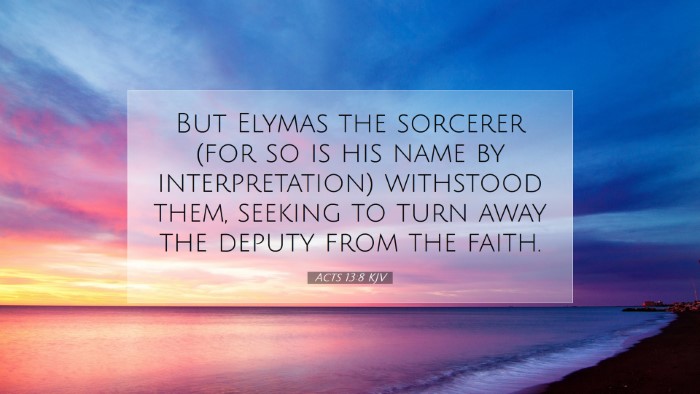Commentary on Acts 13:8
Bible Verse: "But Elymas the sorcerer (for so is his name by interpretation) withstood them, seeking to turn away the deputy from the faith."
Introduction
The narrative of Acts 13:8 provides a significant moment in the early church's missionary endeavors. Within the context of the apostolic mission, the encounter with Elymas the sorcerer unveils the challenges faced by Paul and Barnabas as they sought to share the Gospel. This commentary synthesizes insights from well-known public domain sources, primarily the works of Matthew Henry, Albert Barnes, and Adam Clarke, to explore the theological and practical implications of this verse.
Contextual Background
This verse takes place during Paul and Barnabas's first missionary journey, as they are traveling through Cyprus. The deputy of the region, Sergius Paulus, a man described as “an intelligent man,” seeks to hear the word of God. However, Elymas the sorcerer stands as an obstacle, representing the opposition the Gospel often encounters. The dynamic between the Gospel and sorcery offers ripe ground for theological examination.
Interpretation of Elymas
Elymas, a Representation of Opposition
According to Matthew Henry, Elymas embodies the spirit of opposition against the divine truth. His actions exemplify the reality that not all will welcome the message of Christ. This sorcerer, whose name means "sorcerer" or "magician," used his practices to ensnare the minds of men and divert them from the faith.
Insight from Albert Barnes
Barnes notes the significance of Elymas's role as an interpreter of sorcery, suggesting that his expertise in dark arts provided him with influence over the deputy. He sought to draw the deputy away from the faith, not merely out of malice but likely out of a desire to maintain his control and superiority.
Theological Themes
The struggle between spiritual truth and deceptive practices presents a prominent theme in this narrative. The presence of Elymas serves as a metaphor for the opposition that the Church must confront and overcome while spreading the Gospel.
Faith Versus Sorcery
Matthew Henry articulates that sorcery symbolizes human attempts to manipulate the divine, contrasting sharply with the faith presented by Paul and Barnabas. This delineation serves as a reminder of the power of faith and the ultimate triumph of God's truth.
The Importance of Discernment
As Clarke emphasizes, the encounter illustrates the need for discernment among believers. The faithful must recognize the forces at play in the spiritual realm. Elymas’s opposition is a stark reminder that the faithful may encounter counter beliefs that challenge their convictions.
The Deputy's Search for Truth
Intellectual Curiosity
Sergius Paulus is depicted as an intelligent man, seeking truth. His desire to hear from Paul and Barnabas signals a yearning for understanding amid the spiritual confusion presented by Elymas. Both Barnes and Clarke highlight the deputy’s role as a seeker—a portrayal of those who, despite the influences of the world, desire to uncover divine truths.
Application for Today’s Church
The confrontation between Elymas and the apostles offers valuable lessons for today’s Christians. Whether within personal or communal contexts, the Church frequently faces similar opposition. Elymas’s actions prompt believers to examine their response to spiritual adversity.
Strength in Faith
Dependence on Divine Strength
Henry indicates that reliance on God is essential when facing obstacles. The passage encourages believers to be bold, trusting in the power of the Holy Spirit to guide and enable them to confront opposition.
Proclaiming the Gospel Despite Opposition
Both Barnes and Clarke emphasize the necessity of proclaiming the Gospel irrespective of external challenges. The example of Paul and Barnabas demonstrates commitment and courage, indispensable traits for those tasked with evangelizing in contemporary contexts.
Conclusion
Acts 13:8 showcases a defining moment in the early church's mission, illustrating the complexity of preaching the Gospel in a world rife with both seekers and skeptics. The interplay between Elymas's opposition and the deputy's quest for truth serves as an enduring reminder of the challenges and triumphs inherent in faith. Through the insights from historical commentators, we glean vital lessons on the nature of faith, the reality of spiritual opposition, and the call to remain steadfast in proclaiming the truth of the Gospel.


